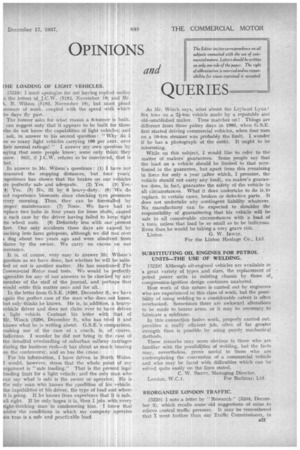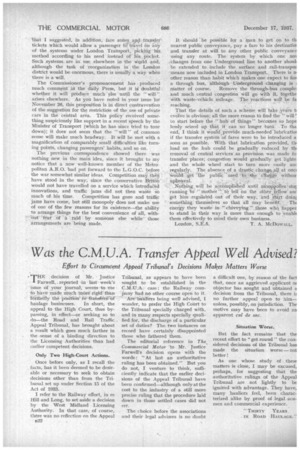SUBSTITUTING OIL ENGINES FOR PETROL UNITS—THE USE OF WELDING.
Page 21

Page 22

If you've noticed an error in this article please click here to report it so we can fix it.
[52191 Although oil-engined vehicles are available in a great variety of types and sizes; the replacement of petrol .power units in existing chassis by those of compression-ignition design continues unabated.
Most work of this nature is carried out by engineers who are experienced in this class of work, but the possibility of using welding to a considerable extent is often overlooked. Sometimes there are awkward alterations to be made to bearer arms, or it may be necessary to fabricate a subframe.
In this connection fusive work, properly carried out, provides a really efficient job, often Of far greater strength than is possible by using purely mechanical Methods.
. These remarks may seem obvious to those who. are familiar with the possibilities of welding, but the facts may, nevertheless, prove useful to those who are contemplating the conversion of a commercial vehicle and who may be faced with difficulties which can be solved quite easily on the lines stated.
C. W. BRETT, Managing Director.
London, W.C.1. For Batimar, Ltd.
REORGANIZE LONDON TRAFFIC.
(52201 I note a letter by "Research" (5204, December 3), which recalls some' old suggestions of mine to relieve central traffic pressure. It may be remembered that went further than our Traffic Cotnmissioner, in 'tha:t I suggested, in addition, fare zonelArid
tickets which would allow a passenger -65" trayel on any of the systems under London Transport , pickiiig his method according to his need instead of his pOcket. Such systems are in use, elsewhere in -the World and although the task of reorganization in the London district would be enormous, there is usually a way when there is a will.
The Commissioner's pronouncement has produced much comment in the daily Press, but it doubtful whether it will produce much' else until the " arises elsewhere. As you have noted in your issue for Nbvember 26, this proposition is in direct contravention of the suggestion for the restriction of the use of private cars in the central area. This policy received something suspiciously like support in a recent speech by the Minister of Transport (which he. has since tried to tone down); it does not seem that the " will " of common sense will make much headway. It will be met with a magnification of comparably small difficulties like turnbig points, changing passengers' habits, and so on,
The previous correspondence showed there was nothing new in the main idea, since it brought to my notice that a now well-known member of the Metropolitan A.R.O. had put forward to the L.G.O.C. before the war somewhat similar ideas. Competition mai' then have stood in the way, since the Conservative would not have travelled on a service which introd"-u&d innovations, and traffic• jams did not then vvaste s'o
much of his time. Competition has gone and traffic jams have come, but still monopoly does not make use of one of the few reasons for its existence—the ability to arrange things for the best convenience of all, with
"out '-fear a raid somebne else while those arrangements are being made. It should " be possible for a Man to get on to th nearest public conveyance, pay a fare to his destinatia and transfer at will to any other public conveyance using any route. The system by which one no ;changes from one Underground line, to another shoul be extended to. include the surface and rail-transpor means now included in London Transport. There is IL other reason than habit which inakes.one expect to fino a through bus, although-Underground changing is 1 Matter of course, Remove the 'through-bus comple: and much central congestion 'will go. with it togethe with waste vehicle mileage. `the 'reactions will be fa reaching.
That the details of such a scheme will take yedrs b evOlve is obvious; all the more reason to find:the '` will' to start before the "hub of things" beConies So hope iessly seized up that it can no longer turn: To tha end, I think it would:yroVide much-needed lubricatim if the transfer system -of fares were to be introduced a soon as possible. With that lubrication provided, thl load on the hub could be gradually reduced by qv removal of central services as provision was made fo transfer places; congestion would gradually get lighte and the whole wheel start to turn more easily am regularly. The absence of a drastic, change all at oncl wOuld. "get the public used to the cha age. with mr upheaval.
Nothing will be accoiuplisbed until monopolies. stoi .
running to " mother " to tell on the citherjeIlow an get him regulated out of their way and start doinc something themselves so that all may benefit.'`.,,. Th(
energy they Waste in " :those who "happen to stand in their way is more than enough to 'enablE them effectively to mind their own business.
London, S.E.5. T. A. McDowAee.




























